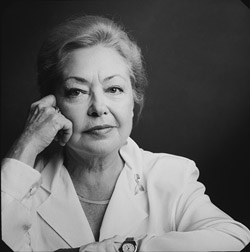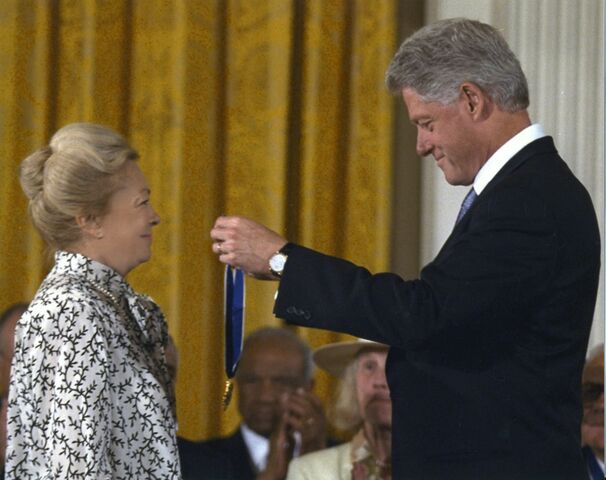Reflections on 30 Years of amfAR
The TREAT Asia Report Interview: Dr. Mathilde Krim

Dr. Mathilde Krim is the founding chairman of amfAR, The Foundation for AIDS Research. While serving as director of the Interferon Laboratory at Sloan-Kettering Institute for Cancer Research in New York City, she co-founded in 1983 the AIDS Medical Foundation (AMF), the first organization dedicated to the support of research on AIDS. In 1985, AMF joined forces with Elizabeth Taylor’s California-based National AIDS Research Foundation to form amfAR. In 2000, President Bill Clinton awarded Dr. Krim the Presidential Medal of Freedom, the highest civilian honor in the United States, in recognition of her contributions to the fight against AIDS.
TREAT Asia Report: amfAR turns 30 this September. Could you tell us about its founding in 1985?
I was a co-founder of the AIDS Medical Foundation (AMF) with Dr. Joseph Sonnabend, a friend and New York City physician who had many patients with a mysterious new and deadly disease. We were fortunate to have on our Board people such as Dr. David Baltimore, a Nobel Prize-winning scientist, Michael Callen, a very well-known activist, and Mary Lasker, a highly respected philanthropist. At the time, AIDS was already a threatening crisis, but very few people were doing anything to help.
My husband, Arthur Krim, was head of Orion Motion Pictures. Many of his friends in show business were gay, and he wholeheartedly supported AMF and its work. Elizabeth Taylor and others were forming a like-minded organization on the West Coast, and I went out to visit her. She invited me to her house, and was immediately interested in working together, so we joined our organizations to form the American Foundation for AIDS Research. From then on, Elizabeth dedicated herself to doing public speaking and even testifying in front of Congress. She also worked with amfAR and with many people in Washington, such as Senator Ted Kennedy, to help get much of the early legislation responding to AIDS passed, including the Ryan White CARE Act of 1990. The latter remains, to date, the largest federally-funded program for people living with HIV in the U.S.

TA Report: Protecting the human rights of people living with HIV has been part of amfAR’s mission since the beginning. Why are human rights important to you personally?
When I was young, my father, who was Swiss, moved his family from Italy to Geneva, Switzerland, due to the threat of World War II. My mother was German, but born in the territory that was then Czechoslovakia. Sometimes someone from her family would suddenly disappear and never be heard from again. So the subject of human rights had often been a topic of conversation in my family.
Then, towards the end of the war, we saw the opening of the concentration camps. I recall going to the cinema and seeing footage of one of the camps, with thousands of people, half of them lying on the floor because they couldn’t walk anymore, looking at you, as if to say, “See what happened to me.” This woke me up. And after that, whenever people would say, “People should not be or do this or that,” I was always on the defensive, because I didn’t want that to happen again, for humanity to treat others the way it did then.
TA Report: How did you first start working with people with HIV?
In the 1980s, I had a lab at the Sloan-Kettering Institute for Cancer Research on a high-up floor overlooking First Avenue. The whole floor was empty except for my lab and my office. I would work until late, so I could see people with AIDS upstairs, and offer them advice and counsel, since the hospital didn’t want to receive them. There wasn’t much advice that I could offer them that was useful, but I felt that they needed to be heard and be offered a little solace and sympathy.
I also helped with other efforts. There was, for example, a woman who approached me in front of my home in Manhattan and asked me if I would help her distribute clean needles. So I went around with her in certain neighborhoods and distributed clean needles.

TA Report: Why do you think it is important that amfAR operate international AIDS programs?
HIV has no borders, and we have funded AIDS prevention research and programs since the early days. In 1987, we gave our first international research grant for a study in Kenya that showed that HIV could be transmitted from females to males, as well as vice versa. Our international activities have kept growing from there. Asa result, it became appropriate for us to change our name from the American Foundation for AIDS Research to simply The Foundation for AIDS Research in 2005.
Currently, we have two programs that embody our commitment to global HIV research and advocacy—TREAT Asia and the GMT Initiative. [GMT stands for gay men, other men who have sex with men, and transgender individuals.] Our TREAT Asia and GMT Initiative projects and partners are doing excellent research, training, and advocacy work. amfAR cannot, however, help all people living with AIDS across the world without strong international programming and funding.